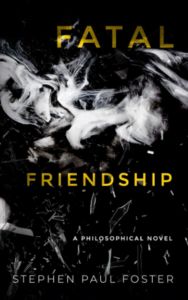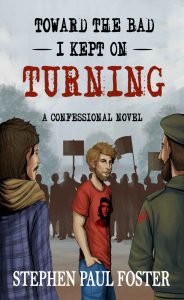Thought Criminal: Stephen Paul Foster’s Fatal Friendship

You can buy Stephen Paul Foster’s novel Fatal Friendship here.
1,987 words
Stephen Paul Foster
Fatal Friendship: A Philosophical Novel
Foster & Dobson, 2023
To subtitle one’s fiction A Philosophical Novel throws down a weighty gauntlet. Some novels which could be described as philosophical slip in and out of the discipline with ease, weaving speculative thought — and even direct mention of philosophers — into the profession of storytelling. Thomas Mann’s The Magic Mountain is a good example. Other novels, such as Albert Camus’ The Outsider, are philosophical novels — in this case a core text of existentialism — without trying to be, not resorting to direct quotation or discussion. This is philosophy as — to use a dreaded phrase co-opted by the woke commissars — lived experience.
The early 1990s saw two books supposedly enriched by philosophy and which gained a midwit following, but both Jostein Garder’s 1991 novel Sophie’s World and Donna Tartt’s The Secret History the following year feel as though the philosophy has been bolted on. Fatal Friendship (FF) by Counter-Currents’ own Stephen Paul Foster, which bears the forthright subtitle noted, is very much a philosophical novel, successful on those terms and not one which allows speculative meanderings to direct proceedings, but rather tethers its philosophizing to the mooring of a tightly wound, detective-novel plot.
Francis H. Bradley is a troubled man, having woken one morning to find himself in possession of “a clear moral vision.” Bradley has acute psychological antennae which seem to trouble him as much as they assist him in understanding others. An alcoholic given to blackouts, Bradley makes the destabilizing discovery that his best friend is a murder suspect. Much of the novel is in flashback as the events leading up to this shocking revelation play themselves out.
Character portrayal here is strong and ornamented, with enough retro detail to be thoroughly convincing. The personalities of the main characters are layered one over another, building the characters at the same time as the retrospective plotline takes twists and makes turns that intertwine with a philosophical progressus which insinuates itself into the novel.
Besides Frank’s moral conundrums, the academic has contemporary culture’s number, able to see beneath the false fraternity of, for example, the world of modern art:
The appreciation of certain modern works of art, he couldn’t help but observe, degenerates into ceremonious competitions of faux sophistication. They unfold in bantering exchanges of slippery abstractions – “purities,” “formal factors,” “opticalities,” “logics of readjustment” — that compose a secret language of verbal smog deployed by the fully initiated to signal each other. “I see your achromatic and raise you one.” Like highly trained parrots, they emit multi-syllabics that have no meaning beyond sounds that evoke a vague sense of arcane intuition.
The author has an ease and economy of phrasing that produces memorable imagery, often via a type of cross-pollination, as when a trenchant model of the married state reads like Conrad written in the style of P. G. Wodehouse:
Every marriage contains built-in detonators that will ignite explosive material at different times once the S. S. Nuptial has sailed out of the wedding harbor and on to the marital high seas.
Contemporary society and its shortcomings exercise Frank, and in place of progress he sees rather the machinations of technocracy, as well as sensing the paradox of its unworkability:
The progress of humanity at some point eliminates the need for rulers with final, sovereign authority. The engine of progress is the delegitimization of authority. Men will someday be governed by benevolence and compassion: Disputes will be settled by reasoned debate, consensus. Conflict will be eliminated by managed, rule-governed processes; power will make way for reason.
In a self-described “philosophical novel,” Foster takes a whimsical risk. My antennae began to twitch at the name of the protagonist, Francis H. Bradley. F. H. Bradley was the British idealist who influenced T. S. Eliot, and the poet wrote his doctoral dissertation on Bradley. Bradley the character receives a phone call from a police officer named Jorge Santayana who wishes to speak with Bradley about the latter’s friend, Richard Wahnfried. Hold on a second, I thought. Jorge Santayana was an American-Spanish philosopher, and Wahnfried was the name of Wagner’s estate at Bayreuth. Six pages in, and I am involved in some dark intellectual parlor game, like a novelistic glass bead game from Herman Hesse’s novel of that title. But Foster is not trying to hide his literary mischief, and refers to Bradley a few pages later as no relation.
As the cast expands, so too does the list of playful allusions to past writers and thinkers. We meet a journalist called Bentham, and by the time he contacts another hack called Sidgwick, Foster had trapped me in his game and I was forced onto Google to discover that Henry Sidgwick was a nineteenth-century Professor of Philosophy at Cambridge. A psychiatrist named Carine Horney is a fierce echo of German psychoanalyst Karen Horney. Wahnfried’s grandfather is one Robert Musil. A figure from philosophy’s past will occasionally walk across the set in person, as when Francis and Richard begin their friendship in Paris in 1978, and Richard is working with French semiotician Roland Barthes. It would take a practiced eye to get all these mischievous allusions, but it doesn’t feel pretentious, just a weave within the book’s whole tapestry, which sets a grisly tale of murder to the rhythm of an underlying and properly philosophical sardonic humor. Foster even has the audacity to introduce one of his famous names as merely a famous name:
One of Richard’s guests was Édith Piaf (not the famous morphine-addict singer), an archivist historian, who also by coincidence had been helping Frank to secure materials from the Bibliothèque Nationale to advance his research.

You can buy Stephen Paul Foster’s novel Toward the Bad I Kept on Turning here.
I shan’t list more of these eponymous guests, because should you read the book, which I suggest you do, you can enjoy a tricksy intellectual parlor-game.
The burgeoning friendship between Bradley and Wahnfried is a rich tapestry of philosophical cross-talk which eventually runs out and into the vagaries of the real world, and the dark deeds that await Richard. But this apparently anomalous killing has a dark precedent, and Wahnfried has what we British call “form” when it comes to murder. One of the journos digs out a killing in Peru (even the hacks quote French intellectual Louis Althusser, who famously beat his wife to death) performed in almost exactly the same circumstances as the later murder. Bradley must reassess a friend he had hero-worshiped.
Bradley’s friend Wahnfried is the chief suspect in the murder of a woman — much of the book takes women as its subject matter — and this sets the mentally precarious Bradley into an abyss of self-absorption. This grasping at stability takes place at the philosophical level, as Bradley uses the past’s dead sages as a sort of support group for life’s vagaries:
He compared his current state of mind with Nestorius, the Christian patriarch on the eve of his proscription and exile for heresy. Edward Gibbon had remarked of him in the Decline and Fall of the Roman Empire: “The past he regretted, he was discontented with the present, and the future he had reason to dread.” Past, present and future had collapsed in Frank’s consciousness into a muddle of regret, discontent and dread.
This is the dynamic of the novel, and shows a particular type of person often ridiculed by those who lack self-awareness but are, ab definitio, unaware of the fact. Those who engage with life at the philosophical level engage with philosophy to do so, and what is deemed pretentious by some is simply the way some of us go about our day.
I was once told that, although I knew a lot about the philosophies of various writers, I lacked one of my own. I replied with something I believe to have been said by Julius Caesar (though I have never confirmed its provenance) to the effect that I would rather be a notebook for the sayings of great men than be a great man myself. Fatal Friendship is certainly a notebook for the sayings of great men, sprinkled as it is with couplets, rhymes, and aphorisms from Eliot, Pound, Nietzsche, Marvell, and others. This is a literary device I am fond of myself, having picked up the habit from Montaigne.
Foster’s prose style is sophisticated without being obscure, and swings on the page in a way in which American novelists have always outshone we Brits. The English could never have invented jazz. Flashback sections, particularly those that deal with the stellar career of Bradley’s friend and now murder suspect, Richard, are at times reminiscent in style of Martin Amis, and at others of Amis’ hero, Saul Bellow.
For men such as Frank, philosophy is Senecan. It’s not a dry discipline on which to grind away one’s professional time, but a crutch, a salve, a consolation. On hearing the grim details of the murder his friend has committed, and comparing the Wahnfried of his deep acquaintance with a savage slaughterer of women, Frank seeks solace and finds it in his namesake:
Frank fell back again into his recliner. Appearance and reality. How does one separate the two? After an hour he picked up a philosophical treatise, Appearance and Reality, that was lying next to his chair. From a Francis Bradley of an earlier time:
But I will not accept nonsense for reality, though it be vouched for by a miracle, or proceed from the mouth of a psychological monster.
This may seem artfully stage-managed (why should a novel not be?), but it is the natural reaction of a certain type of man and, doubtless, woman. Some people, in case of crisis, have their analyst on speed dial, their friends to harry, or plenty of gin in the house. Some others — and this is a very Stoic response — reach for the philosophy to get them through.
Justice comes for Richard Wahnfried, and Foster economically paints the tragedy of the imprisoned middle class:
In Richard’s new home, no Spanish wine. No Greek yogurt with Michigan blueberries. No Shostakovich from the stereo. A baloney sandwich and a small bag of Fritos for lunch. From Oberlin College to the Collège de France to a county jail filled with specimens of Mother Nature’s mistakes from South Florida. From Beethoven’s late string quartets to the Notorious B.I.G. and Snoop Dogg wafting out of the cell radios.

You can buy Mark Gullick’s novel Cherub Valley here.
The court case is perhaps overlong, but is the section which shows most strongly that FF would be eminently filmable in the right, non-woke hands.
No spoilers, but Frank gets more deeply involved with the trial than he would wish, and a crisis of conscience cannot be far behind. Frank’s inner turmoil reminds us that, however high we may soar on the wings of speculative thought, good and evil, those two faithful old family retainers, are waiting patiently on the ground. Frank has been forced to reappraise a special level of friendship due to the leering, diabolical face of evil acts in evil times. A legal theorist, Frank has no energy left for the future now that nature’s laws have rearranged themselves. Even philosophy couldn’t save him — philosophy which had, at the last, “failed to retrieve him from the nihilism and skepticism that had overtaken him.”
Frank’s final moral epigraph is as desperate as any consideration, any reading, of good and evil:
Good operates at a disadvantage with evil because good has rules it must follow, while evil’s only rule is that it transcends all rules.
Fatal Friendship is not a classic battle between good and evil but rather the internalization of one man’s changing perception of these strange cousins. His final epiphany seeks to wipe the slate clean of his experience with Wahnfried and wipe away with it the facile promises of the modern world. For those who like moral dilemmas, sassy prose, well-paced arcs of character development, and the presence of philosophy in the storyline that doesn’t feel strapped on as an afterthought, Fatal Friendship is a novel which repays inspection.



